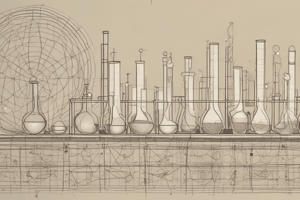Podcast
Questions and Answers
What should be included in the headings of a results table?
What should be included in the headings of a results table?
- Methodology used
- Only the independent variable
- The author's name
- Units of measurement (correct)
When calculating the mean of repeated measurements, what should be done with outliers?
When calculating the mean of repeated measurements, what should be done with outliers?
- Calculate the mean with and without them
- List them separately in the table
- Ignore them while calculating the mean (correct)
- Include them in the calculations
In Ben's experiment, what is the independent variable?
In Ben's experiment, what is the independent variable?
- The amount of ice used
- Time measured in seconds (correct)
- The heat source used
- The temperature of the ice water
What is one way to improve the reliability of the experiment?
What is one way to improve the reliability of the experiment?
Which is an example of a control variable in Ben's experiment?
Which is an example of a control variable in Ben's experiment?
What would be a suitable aim for Ben's experiment?
What would be a suitable aim for Ben's experiment?
What is the range of temperature in Ben's experiment?
What is the range of temperature in Ben's experiment?
Which of the following would NOT be a suitable dependent variable in Ben's experiment?
Which of the following would NOT be a suitable dependent variable in Ben's experiment?
Flashcards
Independent Variable
Independent Variable
The variable that is changed or manipulated by the researcher in an experiment.
Dependent Variable
Dependent Variable
The variable that is measured or observed in an experiment and changes in response to the independent variable.
Results Table (Experiment)
Results Table (Experiment)
A table used to organize data collected in an experiment, typically with columns listing the independent variable and dependent variable(s).
Mean Average
Mean Average
Signup and view all the flashcards
Significant Figures
Significant Figures
Signup and view all the flashcards
Outlier / Anomaly
Outlier / Anomaly
Signup and view all the flashcards
Range of Temperatures
Range of Temperatures
Signup and view all the flashcards
Control Variable
Control Variable
Signup and view all the flashcards
Study Notes
Results Tables
- Tables organize data, with independent variables (changed by experimenter) in the first column and dependent variables (measured) in the rest.
- Repeats (multiple trials) result in a final column for the mean average.
- Calculate mean by adding up values and dividing by the number of repeats.
- All columns require the same number of significant figures.
- Units are included only in the column headings.
- Outliers (anomalous data points) should be identified and excluded from mean calculations.
Example Templates
- No repeats: Independent variable (units) | Dependent variable (units) e.g., Time (seconds) | Temperature (°C)
- Three repeats: Independent variable (units) | Dependent variable (Trial 1) | Dependent variable (Trial 2) | Dependent variable (Trial 3) | Mean
Ben's Experiment
- Aim: Determine how time affects the temperature of ice water.
- Independent Variable: Time (seconds)
- Dependent Variable: Temperature (°C)
- Data:
- Recorded temperature every 15 seconds for 5 minutes.
- Initial temperature: 0°C, final temperatures span 0-70°C
- Temperatures include: 2°C, 4°C, 6°C, 8°C, 11°C, 14°C, 17°C, 21°C, 25°C, 29°C, 35°C, 12°C, 38°C, 43°C, 47°C, 51°C, 55°C, 60°C, 66°C, 70°C
- Range of Temperature: 0°C to 70°C (approximately)
Experimental Design Considerations
- Control Variables: Factors kept constant to isolate the effect of the independent variable.
- Examples: Water volume, heating source, type of heating material.
- Hypothesis: A testable prediction based on prior knowledge.
- Example: As time increases, the temperature of ice water will increase.
- Reliability and Accuracy Improvement:
- Multiple trials for each data point (repeats) to reduce random errors.
- Precise measuring instruments (thermometer and timer) to minimise errors in measurements.
- Repetition under varied conditions to assess the variability of results
Studying That Suits You
Use AI to generate personalized quizzes and flashcards to suit your learning preferences.




